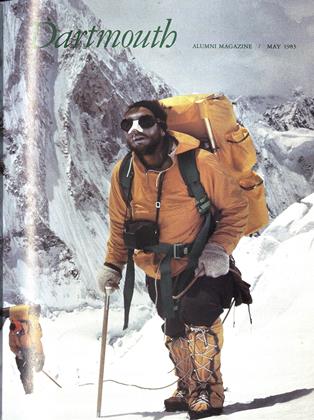ARTIFICIAL REALITY by Myron W. Krueger '64 Addison-Wesley Publishing Company, 1983. 312 pp., $10.95, paper
Here is a lively and imaginative book by a man who has fallen in love with technology and its more playful applications. During the sixties, he helped design several media environments which offered varying degrees of participant interaction. Krueger calls these "responsive environments," and an over-simplified analogy would be a life-sized video game.
Krueger wants to create an entity that engages participants in a dialogue. "The environment expresses itself through light and sound while the participant communicates with physical action," he says. He wants to create thus because he believes art is dead: "The visual is dead. Numbed by the onslaught of visual information, . . . our most heavily-trafficked sense is no longer capable of reacting to paintings or graphics as art." The author also believes that we need "new forms of art and entertainment that will involve our bodies rather than deny them" because "we have all but eliminated the necessity for physical exertion."
Krueger's thinking has led him to an ongoing development the creation of "Videoplace," a responsive environment, a kind of media room, which takes one beyond entertainment into the educational and aesthetic realms. It is a highly imaginative concept impossible to describe in a few sentences but which places human beings in artificial worlds which sense, respond to, and deal with specific societal needs.
Artistically these projects are naive and uninformed (the author appears not to know that many of his fantasies have been realized by artists such as James Seawright, Woody Vasulka, Len Lye, and Nam June Paik), and Krueger seems to want to be an artist even though his most valuable contribution is as a philosopher/ inventor who shows us many remarkable applications for new technology. His explanations of new video techniques are lucid and aimed at the layman. So too are his impressive and useful discussions of computer hardware and software. His remarkable projections of the future use of computers will delight any reader. How about the "hugaphone" for couples separated by travel? "Even at night a couple would be aware of each other's stirrings as they slept. Voice communications would always be available in the infrequent event that one of them spoke. Tactile communication, which requires low bandwidth, might be included to provide a physical as well as auditory presence." Move over, sweetheart, I want to read Krueger's next book!
Jon Appleton is Geisel Professor in the Humanities at the College, as well as professor of musicand director of the Bregman Electronic MusicStudio.
 View Full Issue
View Full Issue
More From This Issue
-
 Feature
FeatureAlumni College Retrospective
May 1983 By Jean Dalury -
 Cover Story
Cover StoryDartmouth on Mt. Everest
May 1983 By Fritz Hier '44 -
 Feature
FeatureBack to the Source
May 1983 By Matt Haley '83 -
 Cover Story
Cover StoryA CAMPAIGN CELEBRATION
May 1983 -
 Sports
SportsSports
May 1983 By Brad Hills '65 -
 Article
ArticleThe Children's Own Curator
May 1983 By Shelby Grantham
Jon H. Appleton
Books
-
 Books
BooksMr. William A. Hunt '28 is the author of an article
June 1933 -
 Books
BooksYARDSTICKS FOR INDUSTRIAL RESEARCH.
April 1960 -
 Books
BooksDEFENSE AND NATIONAL SECURITY.
April 1955 By ARTHUR FLANDREAU -
 Books
BooksL'HÉRITAGE FRANCAIS.
January 1954 By GEORGE E. DILLER -
 Books
BooksTHE STAGE MANAGER'S HANDBOOK.
January 1954 By HENRY B. WILLIAMS -
 Books
BooksANGOLA.
OCTOBER 1971 By LEO SPITZER



